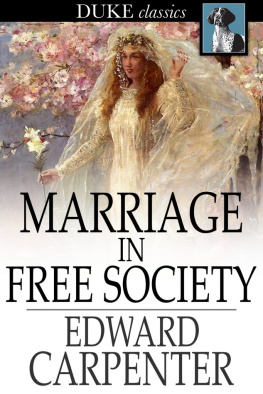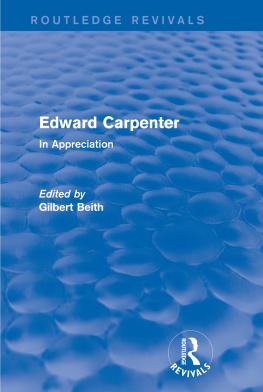Routledge Revivals
Englands Ideal
Originally published in 1887, Edward Carpenters Englands Ideal and other Papers on Social Subjects is a collection of his essays in the field of social science with a focus on English society at the time of writing. His writing was so influential that there was a near constant demand in the late nineteenth and early twentieth centuries for this work to be reprinted with this particular edition being published in 1919. Papers included in this volume discuss issues such as labour, trade and property and all provide insight into the English class structure as well as illuminating Carpenters socialist values. This title will be of interest to students of sociology.
Englands Ideal
And Other Papers on Social Subjects
Edward Carpenter
First published in 1887
by George Allen & Unwin Ltd
This edition first published in 2016 by Routledge
2 Park Square, Milton Park, Abingdon, Oxon, OX14 4RN
and by Routledge
711 Third Avenue, New York, NY 10017
Routledge is an imprint of the Taylor & Francis Group, an informa business
1887 George Allen & Unwin Ltd
All rights reserved. No part of this book may be reprinted or reproduced or utilised in any form or by any electronic, mechanical, or other means, now known or hereafter invented, including photocopying and recording, or in any information storage or retrieval system, without permission in writing from the publishers.
Publishers Note
The publisher has gone to great lengths to ensure the quality of this reprint but points out that some imperfections in the original copies may be apparent.
Disclaimer
The publisher has made every effort to trace copyright holders and welcomes correspondence from those they have been unable to contact.
A Library of Congress record exists under LC control number: 96206109
ISBN 13: 978-1-138-18448-0 (hbk)
ISBN 13: 978-1-315-64514-8 (ebk)
ENGLANDS IDEAL
SOME OPINIONS OF THE PRESS.
CONTENTS: Englands IdealModern Money Lending and the Meaning of DividendsSocial Progress and Individual EffortDesirable MansionsSimplification of LifeDoes it Pay?TradePrivate PropertyThe Enchanted Thicket.
This is a volume of the Social Science Series. On its first appearance it attracted considerable attention, and there has been a steady demand for it ever since.
There is something in these papers to remind the reader of Ruskin, something to remind him of Walt Whitman, and more to remind him of Thoreau. But they are far from being echoes of the thoughts of any of these men, or of anyone else. Mr. Carpenter is at least an original inquirer and thinker, and as such he stimulates thought in others. This service of making them think is the highest service a writer can do for his fellow-men and women.Academy.
The author of this book knows well how to express his ideas; indeed, to him writing, we should think, is a pleasant occupationa recreation rather than the toil it is to most people. The result is that he has a fresh and lively style, and that the reader gets interested in what he has to say.Inquirer.
These essays should have been got up luxuriously, and offered at half a guinea, for they are specially addressed to the rich. Their literary power is unmistakable, their freshness of style, their humour, and their amiable enthusiasm.Pall Mall Gazette.
A clear, candid, gentle mind looks out from every page, and those who disagree with the authors views will be the better for coming into contact with the authors spirit.National Reformer.
ENGLANDS IDEAL
and OTHER PAPERS ON SOCIAL SUBJECTS
BY
EDWARD CARPENTER
First Edition, June 1887; Second Edition, February 1895; Third Edition, June 1901; Fourth Edition, September 1902; Fifth Edition, February 1906; Sixth Edition, June 1909; Seventh Edition, December 1913; Eighth Edition, February 1917; Ninth Edition, March 1919.
.
Behold the hire of the laborers, which is of you kept back by fraud, crieth: and the cries of them are entered into the ears of the Lord of Sabaoth.
WHILE it seems to be admitted now on all hands that the social condition of this country is about as bad as it can be, and while many schemes, more or less philanthropic or revolutionary, are proposed for its regeneration, it just occurs to me to bring forward, by way of balance, the importance of personal actions and ideals. For as the nation is composed of individuals, so the forces which move the individualthe motives, the ideals, which he has in his mindare, it seems to me, the main factors in any nations progress, and the things which ultimately decide the direction of its movement.
At the bottom, and behind all the elaborations of economic science, theories of social progress, the changing forms of production, and class warfare, lies to-day the fact that the old ideals of society have become corrupt, and that this corruption has resulted in dishonesty of life. It is this dishonesty of personal life which is becoming the occasion of a new class-war, from whose fierce parturition-struggle will arise a new idealdestined to sway human society for many a thousand years, and to give shape to the forms of its industrial, scientific, and artistic life.1
The feeling, indeed, seems to be spreading that England stands already on the verge of a dangerous precipice; at any moment the door may open for her on a crisis more serious than any in her whole history. Rotten at heart, and penetrated with falsehood, her aristocracy emasculated of its manhood, her capitalist classes wrapped in selfishness, luxury, and self-satisfied philanthropy, her Government officesarmy, navy, and the resteffete, plethoric, gorged (in snake-like coma) with red tape,2 her Church sleeping profoundlysnoring aloudher trading classes steeped in deception and money-greed, her laborers stupefied with overwork and beer, her poorest stupefied with despair, there is not a point which will bear examination, hardly a wheel in the whole machine which will not give way under pressure. The first serious disturbance now, and the wheels will actually cease to go round; the first great strainEuropean or Eastern warand it seems not improbable that the governing classes of England will succumb disgracefully. Thenwith an exhausting war upon us, our foreign supplies largely cut off, our own country (which might grow ample food for its present population) systematically laid waste and depopulated by landlord legislation, with hopeless commercial depression, stagnation of trade, poverty, and growing furious anarchyour position will be easier imagined than described.















